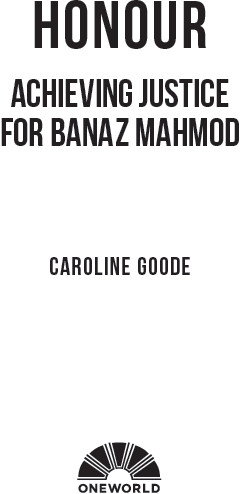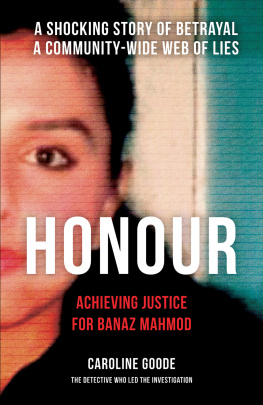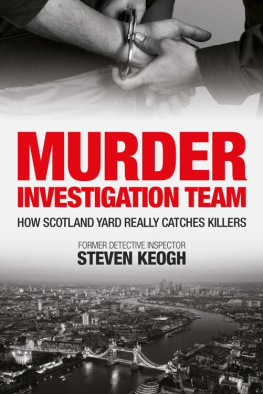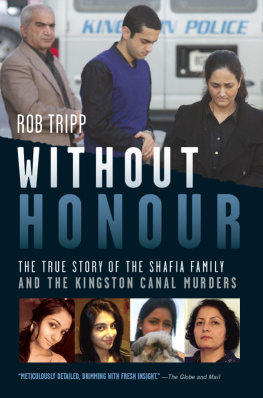
Contents
PROLOGUE
Most murder investigations start with a dead body. The investigation is almost formulaic. The crime scene is examined and lines of enquiry are developed. A post-mortem examination takes place which normally gives you a cause of death. Witnesses are interviewed, CCTV and telecommunications data examined, so that by the time you are searching addresses you know at least what you are looking for.
Each homicide team in London there were twenty-four in 2005 was led by a detective chief inspector or DCI. He (there were no female DCIs at that time) oversaw either two or three detective inspectors, five detective sergeants, a dozen or so detective constables and a number of civilian support staff. Thats what it said on paper, anyway.
The fact that I found myself in charge of Team 16 on the world-famous Metropolitan Police Homicide and Serious Crime Command was a stroke of great good fortune. Just before Banaz Mahmod went missing, my DCI handed in his notice. Out of the three of us detective inspectors on Team 16, one was brand new and the other was offered a job elsewhere. I soon found myself acting DCI by default.
At any one time, three out of the twenty-four teams are on call, covering the initial response to all murders across London. Another team might then take over an investigation based on their capacity. That is known as being in the frame, a legacy from the days when a teams details were literally entered into a wooden frame at Scotland Yard. Each team would already be dealing with between ten and fifteen murders at various stages of investigation. But nobody likes handing jobs over to another team. The honest truth is that homicide investigation work is absolutely fascinating. Sad yes. Horrifying even, but interesting and rewarding like nothing else I have ever experienced.
When Banaz went missing, Team 16 were on call, with me at the helm for the first time, and I was determined to prove myself. As the saying goes, be careful what you wish for. My first case as DCI did not start with a body. There was no post-mortem, not even a crime scene. Everything about the investigation was upside down, it was like working in reverse. We didnt know who or what we were looking for. Unlike most murders, we didnt even know if this one had happened.
PART ONE
FINDING BANAZ
MISSING
Lewisham, South London, January 2006
The call almost always comes in the wee small hours, when you are awakened from a deep sleep by the mobile ringing. You stand there in the freezing cold, trying to keep your voice down so you dont wake the family, trying to clear your head enough to take in the vital information and planning, even while you are still taking in the details, what needs to be done, when and by whom.
Police refer to the initial response to any critical incident as the golden hour. Those first crucial minutes after a crime has been reported might be your only opportunity to gather vital evidence, to seize exhibits and to trace witnesses and suspects. If you mess it up at the beginning, it is very difficult, sometimes impossible, to recover it later. There is nothing quite like it for focussing the mind.
The call that sparked this investigation, however, didnt happen like that. It came late one January afternoon from a detective inspector (DI) based at Merton. He was calling the Homicide Command for advice as he was worried about one of his missing persons.
A missing-persons investigation can be difficult to get right. With some cases, like missing children, you know you have to throw everything you have at it in order to recover the child as quickly as possible. If a child has been abducted, statistics show that there is only a small time window before the child is killed.
With missing adults, however, it is far more difficult. Adults go missing for all sorts of reasons maybe because they want to, maybe because they havent thought to tell someone where they are. They have greater means and motive to go missing than children and, on the whole, are less vulnerable. For that reason, far fewer police resources are expended on investigating missing adults unless there are very obvious aggravating factors.
The story told to me by the local DI was this: he was investigating the disappearance of a young Kurdish woman by the name of Banaz Mahmod. Banaz had been the subject of an arranged marriage, but had left her husband in July the previous year due to physical and sexual abuse, returning to live with her parents in south London. She had subsequently started a relationship with another man, Rahmat Suleimani, and it was he who was now reporting her missing.
Rahmat had explained that for a Kurdish woman to leave her husband brought shame on the whole community and that it was common for the woman to be killed by her family in order to restore their honour. He claimed that Banazs uncle, Ari Mahmod, had threatened to kill both him and Banaz, and had in fact already made attempts on both of their lives.
Police records confirmed that eight weeks earlier, Banaz had indeed reported that her uncle Ari had threatened to kill her. Uniformed police officers had visited Banazs address and spoken to her parents, who were absolutely adamant that they did not want to report her as a missing person. They told police they were very liberal parents. Their daughters were free to come and go as they pleased and frequently stayed out overnight. With that, the police had withdrawn from the property. If the parents were happy, surely there was no cause for concern?
But Rahmat was persistent. He insisted that the parents were lying. Nothing could be further from the truth, he claimed: the daughters were virtually prisoners in their own home. The detective inspector and I agreed that there was enough to make us concerned for Banazs welfare.
The Homicide Command in those days were mandated to take on other serious crime at their discretion. Successive swingeing government cut-backs had resulted in resources for local police stations being absolutely squeezed dry to the point where it was a struggle to investigate even the most basic offences. The fact that their results were as good as they were was a tribute to the commitment of the men and women who made the system work. But an investigation such as a high-risk missing person, particularly one with multiple suspects, would effectively wipe out a boroughs investigative and analytical resources.
The DI was fully aware that without proof that Banaz was dead, the chances of the Homicide Command taking on the job were pretty minimal. He was just doing the responsible thing and touching base to see if there was anything I could suggest that he hadnt already thought of, two heads being better than one and all that. But I had been in his position, having spent three years as a DI in Lambeth. I knew just what it was like to cope with the onslaught, the non-stop tide of major crime, all the rapes, robberies and assaults, each with its potential for complaints and community dissatisfaction.
I offered him a compromise. Together we came up with an investigative strategy which he would manage with his own resources over the next twenty-four hours. If, after all the basic enquiries were exhausted, there was still no sign of Banaz, I would take the investigation off his hands.
The plan was to treat Rahmat and Banazs parents and uncle as significant witnesses at that stage. We had insufficient information to treat them as suspects. I wanted thorough, comprehensive searches at Banazs home address, Rahmats address, Uncle Aris address and Banazs grandmothers address. Every loft, basement and outbuilding needed to be searched and I wanted any phones, computers, diaries, bank statements, travel cards absolutely anything from which we could glean information about Banazs lifestyle and movements.









